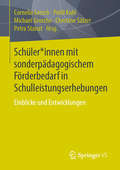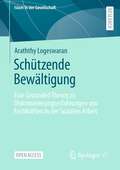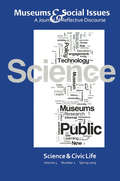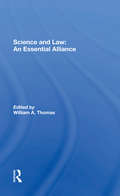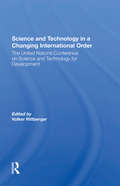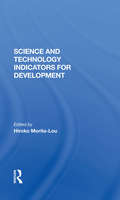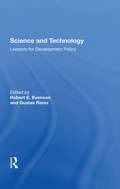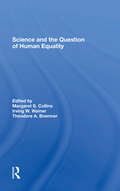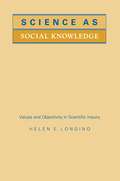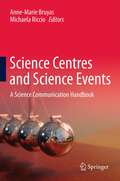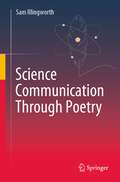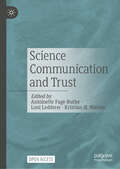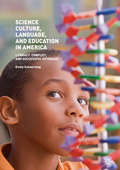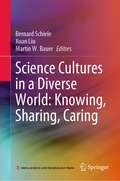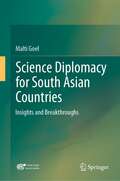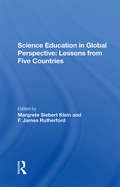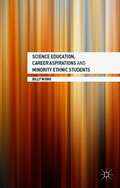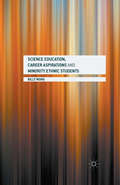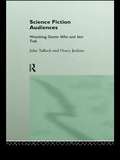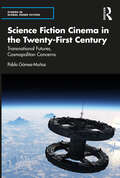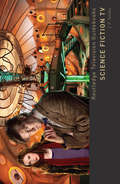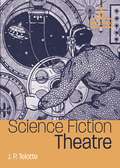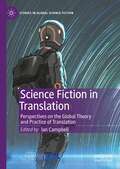- Table View
- List View
Schüler*innen mit sonderpädagogischem Förderbedarf in Schulleistungserhebungen: Einblicke und Entwicklungen
by Poldi Kuhl Petra Stanat Cornelia Gresch Christine Sälzer Michael GroscheDieser Band bringt Beiträge zusammen, die sich aus unterschiedlichen fachlichen Perspektiven mit der Einbeziehung von Schüler*innen mit sonderpädagogischem Förderbedarf in Schulleistungserhebungen beschäftigen. Hierbei werden insbesondere Spannungsverhältnisse zwischen standardisierten Erhebungsverfahren und individualisierten Herangehensweisen reflektiert und Empfehlungen zur Qualitätssicherung in zukünftigen Studien abgeleitet.Der InhaltKonzeptionelle Aspekte der Diagnose von sonderpädagogischem Förderbedarf • Herausforderungen bei der Sicherstellung internationaler Anschlussfähigkeit von Forschung zur Situation von Schüler*innen mit sonderpädagogischem Förderbedarf in Deutschland • Methodische Aspekte der Einbeziehung von Schüler*innen mit sonderpädagogischem Förderbedarf in Schulleistungserhebungen • Erkenntnisse zu ausgewählten Bedingungen und Erträgen schulischer InklusionDie Herausgeber*innenDr. Cornelia Gresch ist wissenschaftliche Mitarbeiterin und Co-Leiterin des Projekts „INSIDE- Inklusion in der Sekundarstufe I in Deutschland” am Institut zur Qualitätsentwicklung im Bildungswesen (IQB) an der Humboldt-Universität zu Berlin.Dr. Poldi Kuhl ist Juniorprofessorin für Bildungswissenschaft an der Leuphana Universität Lüneburg.Dr. Michael Grosche ist Professor für Rehabilitationswissenschaften mit dem Förderschwerpunkt Lernen am Institut für Bildungsforschung an der Bergischen Universität Wuppertal.Dr. Christine Sälzer ist Professorin für Erziehungswissenschaft an der Universität Stuttgart.Dr. Petra Stanat ist wissenschaftlicher Vorstand des Instituts zur Qualitätsentwicklung im Bildungswesen (IQB) an der Humboldt-Universität zu Berlin und Professorin an der Humboldt-Universität zu Berlin.
Schützende Bewältigung: Eine Grounded Theory zu Diskriminierungserfahrungen von Fachkräften in der Sozialen Arbeit (Islam in der Gesellschaft)
by Araththy LogeswaranIn diesem Open-Access-Buch wird eine qualitative Studie zum Thema Diskriminierungserfahrungen von Fachkräften der Sozialen Arbeit vorgestellt. Ziel der Arbeit ist es, eine gegenstandsverankerte Theorie abzubilden, die hilft, den Umgang mit Diskriminierungserfahrung – insbesondere Rassismuserfahrungen – zu beschreiben: Wie verhalten sich Betroffene in diskriminierenden Situationen? Wie gehen sie mit ihren Erfahrungen außerhalb der diskriminierten Situation um? Einer der Schwerpunkte der Untersuchung ist das Zusammenspiel der Erfahrungen und des professionellen Arbeitskontextes. Das Theoriemodell der Schützenden Bewältigung ist ein Beitrag zur rassismuskritischen Sozialen Arbeit und lädt zu einem Perspektivenwechsel ein. Die theoretischen Überlegungen bieten gleichzeitig Anknüpfungspunkte für die Praxis.
Science & Civic Life: Museums & Social Issues 4:1 Thematic Issue (Museums & Social Issues)
by Kris Morrissey Robert GarfinkleFirst Published in 2017. Routledge is an imprint of Taylor & Francis, an Informa company.
Science And Law: An Essential Alliance
by William A ThomasLaw and science are pervasive in society, and we depend upon their fruitful collaboration to promote stability and progress. The substance and procedures of law guide our judicial, legislative, and administrative systems. Science and technology stimulate our imagination and contribute to the production and distribution of virtually all goods and services. The need for scientists and lawyers to understand the strengths and limitations of each other's profession has never been more apparent.
Science And Technology In A Changing International Order: The United Nations Conference On Science And Technology For Development
by Volker RittbergerAs part of its contribution to the 1979 United Nations Conference on Science and Technology for Development IUNCSTD) the United Nations Institute for Training and Research jUNITAR) organized an informal research group to assess various aspects of applying science and technology to development through the United Nations system. This research group was constituted in early 1978 at the initiative of Dr. Robert S. Jordan, former Director of Research at UNITAR, and was headed by Professor Volker Rittberger, a UNITAR Special Fellow. One of the activities of this group has been the production of a series of working papers on science and technology. These papers seek to provide preliminary analyses rather than definitive conclusions. Their purpose is to facilitate the access of others to the ongoing work of the group and to stimulate critical comments and reactions leading to further improvement of this work.
Science And Technology Indicators For Development
by Hiroko Morita-louThe current indicators used to measure the impact of science and technology in developing countries have been formulated based on conditions and assumptions that are primarily relevant to developed countries. The contributors to this volume contend that these indicators, when applied to developing countries, often lead to inaccurate conclusions. An
Science And Technology: Lessons For Development Policy
by Gustav Ranis Robert EvensonThis book presents several general theoretical notions about the process of science and technology as it relates to development. It develops the international dimension of science and technology in terms of the international exchange processes and the appropriateness and modification of technology.
Science And The Question Of Human Equality
by Margaret S Collins Irving W Wainer Theodore A. BremnerThis book provides an interdisciplinary look at racism and science, investigating the biological and social realities of individual and group differences. The contributors examine race and racial distinctions, environmental versus genetic contributions to IQ and to cognitive skill level, the impact of biocultural interactions on behavior, and the problems of achieving an objective appraisal of inter- and intragroup differences in humans. They also consider a possible model for cultural and biological evolution, recommending a careful selection of models and methods of approach for sciences concerned with the study of man. The book includes recent findings in the area of race and IQ, documents instances of racism and classism, and analyzes factors underlying these phenomena.
Science As Social Knowledge: Values And Objectivity In Scientific Inquiry
by Helen E. Longino<P> Conventional wisdom has it that the sciences, properly pursued, constitute a pure, value-free method of obtaining knowledge about the natural world. <P>In light of the social and normative dimensions of many scientific debates, Helen Longino finds that general accounts of scientific methodology cannot support this common belief. Focusing on the notion of evidence, the author argues that a methodology powerful enough to account for theories of any scope and depth is incapable of ruling out the influence of social and cultural values in the very structuring of knowledge. <P>The objectivity of scientific inquiry can nevertheless be maintained, she proposes, by understanding scientific inquiry as a social rather than an individual process. Seeking to open a dialogue between methodologists and social critics of the sciences, Longino develops this concept of "contextual empiricism" in an analysis of research programs that have drawn criticism from feminists. <P>Examining theories of human evolution and of prenatal hormonal determination of "gender-role" behavior, of sex differences in cognition, and of sexualorientation, the author shows how assumptions laden with social values affect the description, presentation, and interpretation of data. <P>In particular, Longino argues that research on the hormonal basis of "sex-differentiated behavior" involves assumptions not only about gender relations but also about human action and agency. She concludes with a discussion of the relation between science, values, and ideology, based on the work of Habermas, Foucault, Keller, and Haraway.
Science Centres and Science Events
by Anne-Marie Bruyas Michaela RiccioThe idea for this text stemmed from the fruitful experience gathered during the training course of 9 Nigerian university students organized in Naples from 3 to 18 September 2008 by the team of Fondazione IDIS-Città della Scienza under the project Science Centre Owerri. The training course turned out to be not only an educational opportunity to acquire knowledge and skills for these students, but also a real and practical tool that later led to the realization of the first Science Festival of Owerri in Nigeria in May 2009. This in turn sparked the idea of creating a highly practical handbook for those who want to face the challenge of developing new projects for the dissemination and socialization of science in developing countries. In these countries, the role of scientific education and training in schools is not sufficient to arouse scientific curiosity among young people and make the population aware of the importance of scientific knowledge in everyday life. Moreover science and technology are indispensable tools for people's empowerment and should be supported with actions that encourage curiosity about science and the intelligent use of technology to bridge the divide with developed countries. It is therefore necessary to set up activities that are carefully targeted to promote and communicate science. The text has been designed as a practical guide to be used in a variety of contexts: scientific events or more structured science festivals, training, the creation of scientific cultural associations, and the development of new science centres. Besides being an excellent tool for training and supporting the design and planning phases, the manual can also be used as a reference work for institutions and local cultural services which have to select projects of this type.
Science Communication Through Poetry
by Sam IllingworthScience Communication Through Poetry aims to explore how we might communicate science effectively both to and with non-scientific audiences across the spectrum of science communication, from dissemination to dialogue, via the medium of poetry. It has been written for scientists, science communicators, public engagement practitioners, and poets, so that they can learn how to use poetry as an effective tool through which to diversify science. As well as containing specific advice and guidance for how to use poetry to communicate science with different audiences, this book contains a number of exercises for the reader to reflect on what has been learnt and to put into practice what is discussed. Further study and additional readings are also provided to help improve knowledge, understanding, and familiarity with both poetry and science communication.
Science Communication and Trust
by Antoinette Fage-Butler Loni Ledderer Kristian H. NielsenThis open access book presents groundbreaking research, offering new empirical findings, showcasing a range of different methods, and advancing theoretical perspectives relating to science communication and trust. The investigation of science communication and trust is enhanced by the many international scholars and disciplinary approaches featured. The book includes three thematic sections: the first focuses on the role of trustworthy science communicators, the second is concerned with the varying contexts of science communication for trust, while the third unpacks various features of trust in science. The volume thus provides the reader with invaluable insights into the highly salient topic of science communication and trust.
Science Culture, Language, and Education in America: Literacy, Conflict, And Successful Outreach
by Emily SchoerningCan the culture and language of science be an alienating force that discourages marginalized people from identifying with scientists and pursuing higher education in the sciences? More broadly, does an education system which unwittingly presents science as a distinct culture result in a population susceptible to doubt, confusion, and denial? This volume explores how this 'culture of science' is reflected and transmitted in the classroom, and how this can have wide-reaching and often negative implications for science education and science literacy. Well-intentioned efforts to bring hands-on scientific experiences into the classroom must also take into account how students perceive the culture of science. Areas of potential conflict include linguistic and cultural behaviors, misconceptions about science and the nature of science, and, in some cases, religious worldviews. Once recognized, these conflicts are resolvable, and valid methods exist to reduce alienation, broaden participation, and ensure that all students, whether or not they pursue STEM careers, leave school knowing that science is something that they can trust.
Science Cultures in a Diverse World: Knowing, Sharing, Caring
by Xuan Liu Bernard Schiele Martin W. BauerScience and technology culture is now more than ever at the very heart of the social project, and all countries, to varying degrees, participate in it: raising scientific literacy, improving the image of the sciences, involving the public in debates and encouraging the young to pursue careers in the sciences. Thus, the very destiny of any society is now entwined with its ability to develop a genuine science and technology culture, accessible for participation not only to the few who, by virtue of their training or trade, work in the science and technology fields, but to all, thereby creating occasions for society to debate and to foster a positive dialogue about the directions of change and future choices.This book organized on the theme of ‘knowing, sharing, caring: new insights for a diverse world’, which was derived from the observation that globalization rests upon diversity—diversity of contexts, publics, research, strategies and new innovating practices—and aims to stimulate exchanges, discussions and debates, to initiate a reflection conducive to decentring and to be an opportunity for enrichment by providing the reader with means to achieve the potentialities of that diversity through a comparison of the visions that underpin the attitudes of social actors, the challenges they perceive and the potential solutions they consider.Thus, this book aims first and foremost to raise questions in such a manner that readers so stimulated will feel compelled to contribute and will do so. In this spirit, however significant, the results presented and shared are less important than the questions they seek to answer: How are we to rethink the diffusion, the propagation and the sharing of scientific thought and knowledge in an ever more complex and diverse world? What to know? What to share? How do we do it when science is broken down across the whole spectrum of the world’s diversity?The book is recommended for those who are interested in science communication and science cultures in the new media era, in contemporary social dynamics, and in the evolution of the role of the state and of institutions. It is also an excellent reference for researchers engaging in science communication, public understanding of science, cultural studies, science and technology museum, science–society relationship and other fields of humanities and social sciences.
Science Diplomacy for South Asian Countries: Insights and Breakthroughs
by Malti GoelThis book provides a science diplomacy outlook as a new governance tool in international cooperation. It elaborates on India's current S&T collaboration with Afghanistan, Bangladesh, Bhutan, Maldives, Myanmar, Nepal, Pakistan, Sri Lanka, and science policy and science diplomacy in India. The book introduces concepts and contours of science diplomacy with international examples. It presents insights into international governance models, mega-science projects, and science diplomacy's role in addressing global climate change and sustainable development challenges. The book is a valuable reference to spark breakthroughs in India’s science diplomacy with its neighbouring countries for scientists, diplomats, policymakers, government, and non-government institutions interested in science and diplomacy.
Science Education In Global Perspective: Lessons From Five Countries
by Margrete Siebert Klein F. James Rutherford F James Rutherford Margrete S. KleinThe decline in the quality of American public school instruction, particularly in science and mathematics, is a well-documented subject of concern for our nation. This book examines the educational systems in Japan, the People's Republic of China, East and West Germany, and the Soviet Union, countries that have developed particularly innovative app
Science Education, Career Aspirations and Minority Ethnic Students
by Billy WongIs science typically for White men? Is science for 'people like us'? What are the barriers and opportunities? This book explores the science career aspirations of minority ethnic students. It investigates the views, experiences and identities of British Black Caribbean, Bangladeshi, Chinese, Indian and Pakistani youths in relation to science.
Science Education, Career Aspirations and Minority Ethnic Students
by Billy WongIs science typically for White men? Is science for 'people like us'? What are the barriers and opportunities? This book explores the science career aspirations of minority ethnic students. It investigates the views, experiences and identities of British Black Caribbean, Bangladeshi, Chinese, Indian and Pakistani youths in relation to science.
Science Fiction - The Evolutionary Mythology of the Future: Prometheus to the Martians
by Thomas LombardoAn evolutionary and transformative journey through the history of science fiction from the innermost passions and dreams of the human spirit to the farthest reaches of the universe, human imagination, and beyond.
Science Fiction Audiences: Watching Star Trek and Doctor Who (Popular Fictions Series)
by Henry Jenkins John TullochScience Fiction Audiences examines the astounding popularity of two television "institutions" - the series Doctor Who and ^Star Trek. Both of these programmes have survived cancellation and acquired an following that continues to grow. The book is based on over ten years of research including interviews with fans and followers of the series. In that period, though the fans may have changed, and ways of studying them as "audiences" may have also changed, the programmes have endured intact, with Star Trek for example now in its fourth television incarnation. John Tulloch and Henry Jenkins dive into the rich fan culture surrounding the two series, exploring issues such as queer identity, fan meanings, teenage love of science fiction, and genre expectations. They encompass the perspectives of a vast population of fans and followers throughout Britain, Australia and the US, who will continue the debates contained in the book, along with those who will examine the historically changing range of audience theory it presents. and continue to attract a huge community of fans and followers. Doctor Who has appeared in nine different guises and Star Trek is now approaching its fourth television incarnation.Science Fiction Audiences examines the continuing popularity of two television 'institutions' of our time through their fans and followers. Through dialogue with fans and followers of Star Trek and Dr Who in the US, Britain and Australia, John Tulloch and Henry Jenkins ask what it is about the two series that elicits such strong and active responses from their audiences. Is it their particular intervention into the SF genre? Their expression of peculiarly 'American' and 'British' national cultures. Their ideologies and visions of the future, or their conceptions of science and technology? Science Fiction Audiences responds to a rich fan culture which encompasses debates about fan aesthetics, teenage attitudes to science fiction, queers and Star Trek, and ideology and pleasure in Doctor Who. It is a book written both for fans of the two series, who will be able to continue their debates in its pages, and for students of media and cultural studies, offering a historical overview of audience theory in a fascinating synthesis of text, context and audience study.
Science Fiction Cinema in the Twenty-First Century: Transnational Futures, Cosmopolitan Concerns (Studies in Global Genre Fiction)
by Pablo Gómez-MuñozRecent films are increasingly using themes and conventions of science fiction such as dystopian societies, catastrophic environmental disasters, apocalyptic scenarios, aliens, monsters, time travel, teleportation, and supernatural abilities to address cosmopolitan concerns such as human rights, climate change, economic precarity, and mobility. This book identifies and analyses the new transnational turn towards cosmopolitanism in science fiction cinema since the beginning of the twenty-first century. The book considers a wide selection of examples, including case studies of films such as Elysium, In Time, 2012, Andrew Niccol’s The Host, Codependent Lesbian Space Alien Seeks Same, and Cloud Atlas. It also questions the seeming cosmopolitanism of these narratives and exposes how they sometimes reproduce social hierarchies and exploitative practices. Dealing with diverse, interdisciplinary concerns represented in cinema, this book in the Studies in Global Genre Fiction series will be of interest to readers and scholars working in the fields of science fiction, film and media studies, cosmopolitanism, border theory, popular culture, and cultural studies. It will also appeal to fans of science fiction cinema and literature.
Science Fiction Cinema in the Twenty-First Century: Transnational Futures, Cosmopolitan Concerns (Studies in Global Genre Fiction)
by Pablo Gómez-MuñozRecent films are increasingly using themes and conventions of science fiction such as dystopian societies, catastrophic environmental disasters, apocalyptic scenarios, aliens, monsters, time travel, teleportation, and supernatural abilities to address cosmopolitan concerns such as human rights, climate change, economic precarity, and mobility. This book identifies and analyses the new transnational turn towards cosmopolitanism in science fiction cinema since the beginning of the twenty-first century.The book considers a wide selection of examples, including case studies of films such as Elysium, In Time, 2012, Andrew Niccol’s The Host, Codependent Lesbian Space Alien Seeks Same, and Cloud Atlas. It also questions the seeming cosmopolitanism of these narratives and exposes how they sometimes reproduce social hierarchies and exploitative practices.Dealing with diverse, interdisciplinary concerns represented in cinema, this book in the Studies in Global Genre Fiction series will be of interest to readers and scholars working in the fields of science fiction, film and media studies, cosmopolitanism, border theory, popular culture, and cultural studies. It will also appeal to fans of science fiction cinema and literature.
Science Fiction TV (Routledge Television Guidebooks)
by J. P. TelotteThe first in the Routledge Television Guidebooks series, Science Fiction TV offers an introduction to the versatile and evolving genre of science fiction television, combining historical overview with textual readings to analyze its development and ever-increasing popularity. J. P. Telotte discusses science fiction’s cultural progressiveness and the breadth of its technological and narrative possibilities, exploring SFTV from its roots in the pulp magazines and radio serials of the 1930s all the way up to the present. From formative series like Captain Video to contemporary, cutting-edge shows like Firefly and long-lived popular revivals such as Doctor Who and Star Trek, Telotte insightfully tracks the history and growth of this crucial genre, along with its dedicated fandom and special venues, such as the Syfy Channel. In addition, each chapter features an in-depth exploration of a range of key historical and contemporary series, including: -Captain Video and His Video Rangers -The Twilight Zone -Battlestar Galactica -Farscape -Fringe Incorporating a comprehensive videography, discussion questions, and a detailed bibliography for additional reading, J. P. Telotte has created a concise yet thought-provoking guide to SFTV, a book that will appeal not only to dedicated science fiction fans but to students of popular culture and media as well.
Science Fiction Theatre (TV Milestones Series)
by J. P. TelotteIn the wake of the juvenile space operas of the early 1950s, a groundbreaking series debuted and paved the way for one of viewers’ favorite genres today: adult-oriented science fiction. Science Fiction Theatre aired with a fresh anthology-style narrative from the vision of veteran producer Ivan Tors and with compelling narration by Truman Bradley. Created by industry-leading syndicator Ziv Television Programs, the show pioneered a scientifically based approach to aliens, telepathy, and the mysteries of the universe that provided a model for Rod Serling’s The Twilight Zone (1959–64) and a myriad of acclaimed programs that followed, including The Outer Limits (1963–65), The Ray Bradbury Theater (1985–92),and Black Mirror (2011–present). This book contextualizes Science Fiction Theatre within the budding American television industry of the 1950s, as powerful networks and independent producers and syndicators vied to create and distribute programming to an audience eager to embrace this new, free medium. Including a complete videography of this historically neglected series, author J. P. Telotte illuminates Science Fiction Theatre as a touchstone for understanding the development of science fiction media and the dynamic nature of early television broadcasting.
Science Fiction in Translation: Perspectives on the Global Theory and Practice of Translation (Studies in Global Science Fiction)
by Ian CampbellScience Fiction in Translation: Perspectives on the Global Theory and Practice of Translation focuses on the process of translation and its implications. The volume explores the translation of works of science fiction (SF) from one language to another and the translation of SF tropes, terms, and ideas of SF theory into cultures outside the West. Providing a comprehensive examination of the state of translation into English, the essays consider how representative the body of translated work of SF is from the source language/culture. It also considers the social, political, and economic choices in selecting a work to translate. The book illustrates the dramatic growth both in SF production outside the Anglosphere, the translation of works from other languages into English, and the practice of translating English-language SF into other languages. Altogether, the essays map the theory, practice, and business of SF translation around the world.
